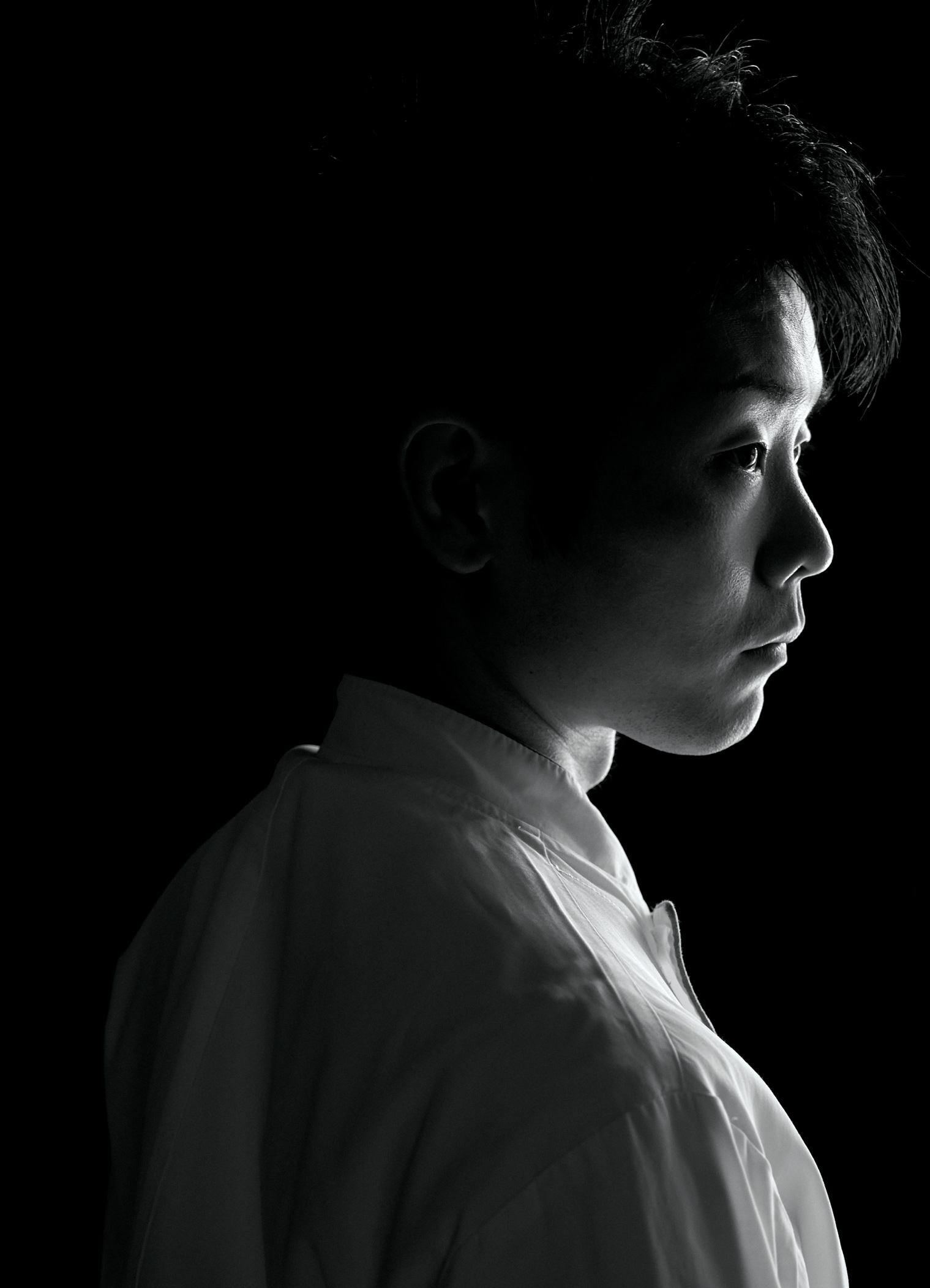


SENSITIVITY
RESTRAINT
It is not possible to discuss this generation of Tokyo chefs without including Shuzo Kishida. Chef at Quintessence since 2006, and sole owner since 2011, his restaurant has long been lauded and lavished with awards galore. When the Michelin Guide launched in Tokyo in 2007, a year after Quintessence opened, Kishida received three stars at the age of thirty-three, the only Japanese chef of French cuisine awarded this honor. He has kept these stars ever since. He is well known and widely respected for his achievements and culinary gifts, and a reservation at his restaurant is one of the toughest in the world to secure.
All of the chefs in this book revere Kishida for his accomplishments. He has a reputation for being not only painstakingly exacting but also shy and rarely deviating from his daily routine. I was cautioned that he might not allow me to photograph him, which made me all the more interested.
When Kishida emerges from the kitchen, he is formal and reserved, but also gracious and visibly happy to interact in French. He looks younger than his forty-three years. Slight and enveloped in classic whites, there is a wispiness and gentle vulnerability to him.
He agrees to be a part of my project, but stipulates that I will not be allowed in his kitchen—a first in my career. Even Marco Pierre White, not exactly known for permissiveness, allowed me to take photos in his kitchen. I am at first taken aback by this stipulation, but then appreciate this insight into Kishida’s way of thinking. He has an aversion to chance and unpredictability. An exceeding level of control is required to maintain his high standards and the status of his restaurant.
The best part of my time with Kishida is the interview. Sitting across the table from me, tranquil, with his hands gently crossed, he is much more candid than I anticipated. He attributes his life as a chef to his parents, who took him to a French restaurant when he was in junior high school. This dinner launched his profound and fervent discovery of self, France, and French food, “all that was bright and beautiful,” he says.
Ultimately, Kishida is not shy. He is someone with an extremely rich and vibrant interior life, a veritable aesthete who is highly affected by the world around him. In some ways, it might be true that he has cordoned himself off, removed from the fray. But it is here that he functions best. He has a deep-seated drive for perfection, and is absolutely firm in how to protect all that he has created.



Why do you cook?
One of the reasons is my parents. They loved cooking and they took me to restaurants when I was young. My parents both worked. My mother arrived home late at night, so there was no time to cook. She would ask the children, three of us, to cook together to help her. I was the youngest. It was a pleasure for me to help my mother. I made Japanese home cooking. My mother was so pleased, and I felt happy because she thanked me as well. It made me feel good; it was unusual for someone to thank me.
How was your first trip to Paris?
When I arrived, I was twenty-six. I felt touched and moved by Paris. I felt much more free in Paris than in Japan. I worked such long hours in Paris, but I could do everything I wanted. I had to work hard, too, but compared with my experiences in Japan, it wasn’t as hard. Sometimes in Tokyo, I was punched and treated badly. Learning in Japan was the strictest in the world at the time.
Tell me about the experience of being awarded three Michelin stars.
I was thirty-three years old. I felt pressure when I received the stars initially, but now I don’t feel as pressured. I care more that the customer is pleased and happy. If my mind, my spirit, and principles don’t change, I don’t think my stars will change. I feel that I am a shokunin [master artisan]. Now there are so many celebrity chefs who are not cooking in their restaurants very often. I wouldn’t want to be like that. I want to cook and be here all the time. There is nothing else in the world I would rather do than be a chef.
What is your earliest food memory?
My mother would always take a dish and try cooking it in different ways. For example, she made curry with grated ginger or cocoa, or added something new. She was always challenging herself to do something different or better. She liked to innovate.
How did you decide on the design of your restaurant?
No flowers, no pictures, no music. Nothing. I want people focused on the meal. Very simple. Same as my dishes. The only deviation is the entrance.
How do you think growing up in Japan informs your style?
Who I am is always related to my cuisine; it is hard to separate the two. I am my cuisine. In French cuisine, compared to Japanese cuisine, it is very complicated to make one dish. Japanese food is simple but also difficult because umami must be extracted from the ingredients. They are essentially two totally different cuisines, but I make a unique French cuisine with Japanese methods.
If you could share a meal with anyone, who would it be?
My parents. How many more times will I be able to have a meal with my parents? I want to treasure my time with them.
